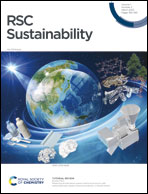New insights into orthophosphoric acid assisted rapid aqueous processing of NMC622 cathodes†
Abstract
The use of orthophosphoric acid to stabilize aqueous processing of high nickel NMC622 electrodes was assessed under rapid processing conditions, in which the active material powder was in suspension for less than 1 hour. It was found, as previously reported, that corrosion of the aluminum current-collector was suppressed, and capacity retention greatly improved relative to aqueous-processed material without orthophosphoric acid addition. The rapid processing conditions led to incomplete reaction of the orthophosphoric acid with the surface of the electrode active material however, with concomitant formation of orthophosphate precipitates upon drying. Reaction of these with organic carbonate electrolytes resulted in rapid cell death typically occurring between 50 and 100 cycles, characterized by formation of a thick degradation film on the NMC622 cathode. Washing with ethanol was found to remove the components responsible for the degradation process, yielding an electrode that demonstrated almost 400 cycles with 78% capacity retention. It is concluded that whilst the addition of orthophosphoric acid aids aqueous processing of NMC materials, close attention must be paid to the quantities and reaction times used.



 Please wait while we load your content...
Please wait while we load your content...